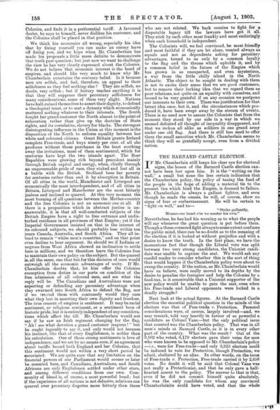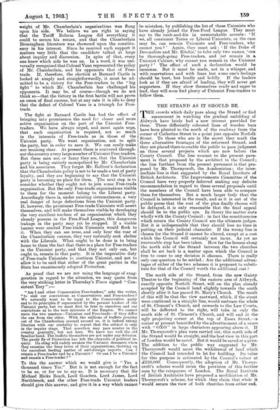THE BARNARD CASTLE ELECTION.
IF Mr. Chamberlain still keeps his clear eye for electoral signs, the lesson of the Barnard Castle election can- not have been lost upon him. It is the "writing on the wall," a small but none the less certain indication that the Chamberlain policy, the policy of taxing the food of the people in the hope of adding a material tie to the present ties which bind the Empire, is doomed to failure. Mr. Chamberlain is always a gallant fighter, and even though he reads the omens, he will, of course, show no signs of fear or embarrassment. He will be certain to "fight on well," and to-
" Strike gallantly, Menace our heart e'er we master his own."
Nevertheless, he has had his warning as to what the people will say whenever the great question is put before them. Though a three-cornered fight always to some extent conftises the public mind, there can be no doubt as to the meaning of the election if it is looked at without prejudice and with a desire to know the truth. In the first place, we have the momentous fact that though the Liberal vote was split between two very strong candidates, the Unionist candi- date was unable to capture the seat. We would ask any candid reader to consider whether this is the sort of thing that would happen if the Chamberlain policy were about to sweep the country. If the nation, as Mr. Chamberlain would have us believe, were really moved to its depths by the desire to penalise the foreigner and help the Colonies by a food-tax, is it conceivable that a Unionist supporter of the new policy would be unable to gain the seat, even when his Free-trade and Liberal opponents were locked in a deadly struggle?
Next look at the actual figures. At the Barnard Castle election the essential political question in the minds of the electors was that of Free-trade v. Protection. Personal considerations were, of course, largely involved—and, we may remark, told very heavily in favour of so powerful a candidate as Colonel Vane—but the only political issue that counted was the Chamberlain policy. That was in all men's minds at Barnard Castle, as it is in every other part of the country. What was the result ? Out of the 9,502 who voted, 6,179 electors gave their votes for men who were known to be opposed to Mr. Chamberlain's policy —i.e., were for Free-trade--and only 3,323 electors could be induced to vote for Protection, though Protection, we admit, sheltered by an alias. In other words, on the issue of Free-trade v. Protection, Free-trade carried it by 2,856 votes. No doubt it will be said that Colonel Vane was not really a Protectionist, and that he only gave a half- hearted assent to the policy. The answer to that is that, even if he did not commit himself quite absolutely, he was the only candidate for whom any convinced Chamberlainite could have voted, and that the whole Weight of Mr. Chamberlain's organisations was flung upon his• side. We believe we are right in saying that the Tariff Reform League did everything it could to secure his return, and that the Chamberlain Birmingham literature was showered upon the constitu- ency in his interest. Since he received such support it Matters very little that the candidate talked at large about inquiry and discussion. In spite of that, every one knew which side he was on. In a word, it was uni- versally recognised that Colonel Vane represented the policy of Mr. Chamberlain, and his opponents that of Free- trade. If, therefore, the election at Barnard Castle is looked at simply and straightforwardly, it must be ad- mitted to be a victory for the Free-traders in the "big fight" to which Mr. Chamberlain has challenged his opponents. It may be, of course—though we do not think so—that the victory in the first battle will not prove an omen of final success, but at any rate it is idle to deny that the defeat of Colonel Vane is a triumph for Free- trade.
The fight at Barnard Castle has had the effect of bringing into prominence the need for closer and more active organisation on the part of the Unionist Free- traders. We have always urged, and must again urge, that such organisation is required, not so much in the interests of Free-trade as in those of the Unionist party. We want organisation, not to split the party, but in order to save it. We can easily make our meaning clear. At present there is scattered through- out the country a very large number of Unionist Free-traders. But these men see, or fancy they see, that the Unionist party is being entirely monopolised by Mr. Chamberlain and his associates. They forget Mr. Balfour's declaration that the Chamberlain policy is not to be made a test of party loyalty, and they are beginning to say that the Unionist party is becoming no place for them. The next step is to consider whether they ought not to join some Free-trade organisation. But the only Free-trade organisations visible to them for the moment belong to the Liberal party. Accordingly there is, under existing circumstances, a very real danger of large defections from the Unionist party. If, however, the prominent Free-trade Unionists will assert themselves, and will make themselves visible by developing the very excellent nucleus of an organisation which they already possess in the Free-Food League, this dangerous leakage in the party may yet be stopped. If a visible banner were erected Free-trade Unionists would flock to it. When they can see none, and only hear the roar of the Chamberlain cannon, they very naturally seek shelter with the Liberals. What ought to be done is to bring home to them the fact that there is a place for Free-traders the Unionist party, and that they not only can, but ought to, remain in that party. It is the imperative duty of Free-trade Unionists to continue Unionist, and not to allow it to be said that either of the great parties in the State has unanimously adopted Protection.
As proof that we are not using the language of exag- geration in regard to the situation, we may quote from the very striking letter in Thursday's Times signed "Con- sistent Tory " "Am I and other Conservative Free-traders," asks the writer, "to sink our convictions as Conservatives and Free-traders ? We naturally want to be loyal to the Conservative party and to its principles if represented by the present leaders of the Unionist party', but we must first be true to ourselves and our convictions as to the best interests of the Empire. We cannot serve the two masters—Unionism and Free-trade—if they differ the one from the other. With the millions of leaflets pouring out of the Chamberlain arsenal around us, it is indeed taking liberties with our credulity to repeat that the subject is only in the inquiry stage. That assertion may pass muster in the country generally, but not here. We know too well the old familiar hand. The leaflets themselves are not under any delusion. The gaudy fly of Protection has left the chrysalis of political in- quiry. Its sting will rudely awaken the Unionist dreamers when they examine the busy hives of their organisations, thriving on the succulent feeding matter of anti-foreign imports. Can I remain a Free-trader and be a Unionist ? Or can I be a Unionist and remain a Free-trader ?
To this the answer which we would give is "Yes, a thousand times Yes." But it is not enough for the fact to be so, or for us to say so. It is necessary that Sir Michael Hicks Beach, Lord Goschen, Lord James, Lord Northbrook, and the other Free-trade Unionist leaders should give this answer, and give it in a way which cannot be mistaken, by publishing the list of those Unionists who have already joined the Free-Food League. They must say to the rank-and-file in unmistakable accents : ' If we, all consistent Tories or Liberal Unionists, as the case may be, can remain Unionists and Free-traders, why cannot you ? ' Again, they must ask : If the Duke of Devonshire and Mr. Ritchie,' to take only two names, can be thorough-going Free-traders, and yet remain in a Unionist Cabinet, why cannot you remain in the Unionist party ? ' The effect of such a declaration would be immense. But it must be made, not in a whisper, and with reservations and with fears lest some one's feelings should be hurt, but loudly and boldly. If the leaders look as if they are afraid of leading, they will never get supperters. If they show themselves ready and eager to lead, they will soon find plenty of Unionist Free-traders to follow them.







































 Previous page
Previous page